What is the calorie content of watermelon, and how is it beneficial for the human body?
During the season, it is recommended to eat watermelon every day. Fresh fruit pulp is a valuable source of micro- and macroelements beneficial to the human body. Watermelon is an ideal option for those who want to eat deliciously and maintain body proportions.
In the article we will look at the health benefits and harms of watermelon, calorie content and nutritional value, what watermelon consists of and contraindications to its consumption.
Chemical composition
Composition of watermelon - 91% water, and the remaining percentages are amino acids, carbohydrates, pectin, ash, alkaline substances.
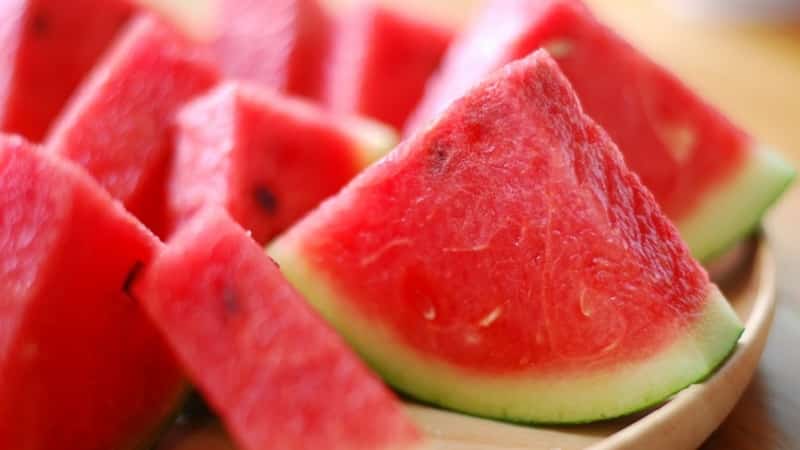
Minerals in the composition:
- calcium;
- potassium;
- magnesium;
- sodium;
- phosphorus;
- selenium;
- copper;
- manganese;
- iron;
- fluorine;
- zinc.
Watermelons contain lycopene, beta-carotene, B vitamins (thiamine, riboflavin, folates, pyridoxine, choline), ascorbic and nicotinic acids, alpha-tocopherol acetate (vitamin E), phylloquinone (vitamin K), betaine.
KBZHU watermelon
Watermelon has a low calorie content - only 30 kcal per 100 grams of pulp, and it is also low in fat.
Contents per serving (100 g) of watermelon:
- proteins - 0.6 g;
- fat - 0.2 g;
- carbohydrates - 7.2 g.
BZHU watermelon for 1 kg: caloric content of fruit pulp - 300 kcal, proteins - 6 g, fats - 2 g, carbohydrates - 72 g.
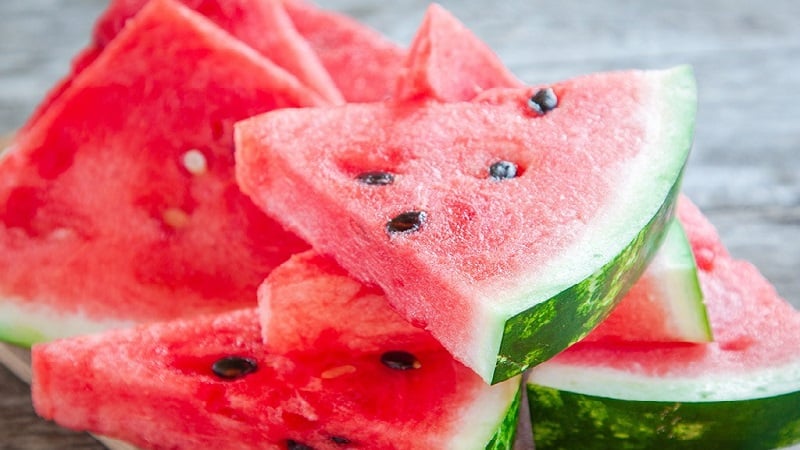
Is it possible to eat berries as a product for weight loss?
It is difficult to think of a more pleasant and simple way to lose weight than the watermelon diet. Many world nutritionists recommend using watermelon for weight loss. due to a number of its beneficial properties:
- removes excess fluid from the body;
- removes swelling;
- cleanses the intestines of toxins and toxic substances;
- improves digestion;
- activates metabolism;
- normalizes water-salt balance;
- contains an enzyme that breaks down fats and lowers blood sugar levels;
- has a laxative effect;
- improves intestinal motility.
Fruit pulp quickly saturates with low calorie content, which allows you to reduce portion size and avoid snacking. Regular consumption of watermelon increases endurance and performance, which stimulates physical activity and additional calorie burning.
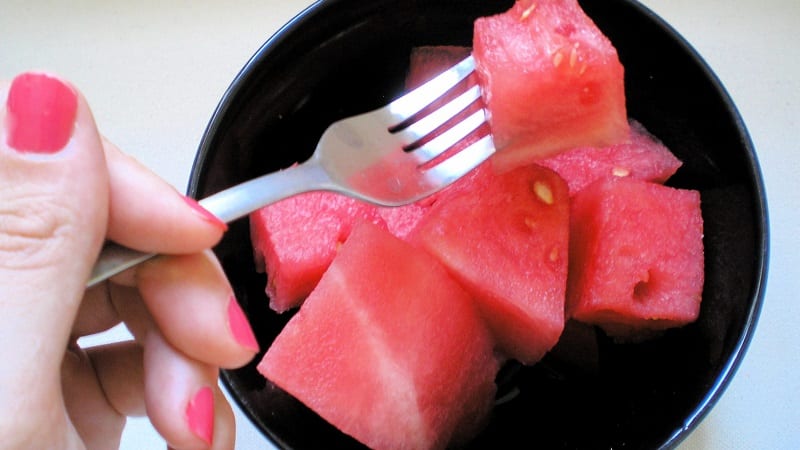
Experts advise everyone who intends to lose weight on a watermelon diet buy fresh and high-quality fruits exclusively in season: early August - late September. If you purchase them ahead of time, there is a high probability of getting a product with nitrates.
For reference. You can determine the ripeness and quality of a watermelon by external signs. The fruit should be large, weighing 6-10 kg, without cuts or cracks, have a small yellow earthen spot on the side, a dry stalk, a shiny top layer without a matte coating, and a clear striped pattern. When squeezed it cracks and when tapped it makes a booming sound.
Glycemic index of watermelon
Watermelon has a high glycemic index - within 65-70 units, which is due to the presence of easily digestible carbohydrates in the composition. Despite the fact that foods with a high index cannot be consumed on a diet, watermelon is widely used for body shaping.
The berry contains a lot of water, and carbohydrates are represented by fructose and glucose, and only during storage of the fruit does harmful sugar accumulate in them.
This is interesting:
The benefits of watermelon juice and how to prepare it
Beneficial properties of watermelon for the human body
Watermelon is a valuable food product that saturates the body with useful substances., provides prevention of a number of diseases, relieves the body. It is beneficial for the heart, blood vessels, gastrointestinal tract, nervous system, liver and kidneys.
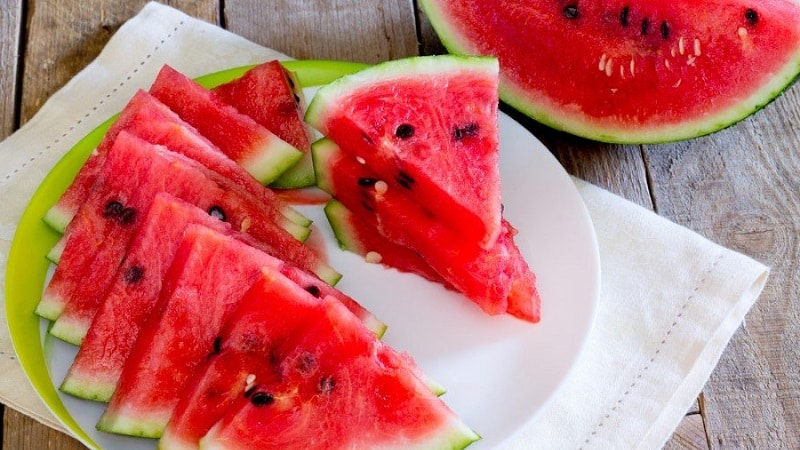
The fruits contain high doses of B vitamins, citrulline, lycopene. The latter lowers cholesterol levels, limits the likelihood of cancer, delays skin aging, protects the body from oxidation, works for the benefit of the heart and blood vessels, and serves as a prevention of myocardial infarction and atherosclerosis.
Citrulline improves muscle blood flow and nutrition, maintains a positive nitrogen balance in the body, increases energy potential, and increases endurance. It also removes urea and uric acid from the body, which is important for people suffering from gout, rheumatic diseases or predisposed to them.
Fruit are beneficial in the treatment of liver and kidney pathologies due to its diuretic effect. This does not create additional stress on the kidneys, which helps avoid the occurrence of stones.
The fruits contain a lot of fiber, which improves bowel function, removes toxins and excess water, relieves constipation.
Watermelon has a beneficial effect on the nervous system: uplifts mood, reduces the effects of stress, has a positive effect on metabolic processes in brain tissue, increases mental performance.
Watermelon is good for eyesight, protects against flu, upper respiratory tract infections, neutralizes dangerous free radicals, is necessary for the proper functioning of the immune system. Folic acid creates favorable conditions for the functioning of the digestive system. Calcium is necessary for normal growth and formation of bone tissue, mineralization of teeth, and prevention of osteoporosis.

For men
Regular consumption of moderate doses of watermelon prevents the occurrence or suppresses the activity of inflammatory phenomena, improves blood circulation in the prostate gland. Citrulline improves erectile function, lycopene protects against prostate cancer.
Although watermelon pulp contains zinc in small quantities, it will also benefit men's health. It is involved in the production of testosterone, the main male sex hormone that affects the development of bone and muscle tissue, responsible for sexual health and libido.
For women
Watermelon is also good for women. He contains vitamin A, which has a beneficial effect on skin condition: it takes on a healthy appearance, uniform color, and small wrinkles are smoothed out.
This vitamin slows down the aging process, participates in the formation of new cells and the production of steroid hormones, restores and maintains epithelial tissue, accelerates the healing process for burns and wounds.
Pectin is also valuable for the female body.. Its functions:
- absorbs fats and acids in the small intestine;
- reduces the content of harmful cholesterol in the blood;
- removes heavy metals, salts, radioactive substances;
- breaks down fat deposits;
- suppresses appetite.
For pregnant women, watermelon pulp is a source of vitamin B9 (folic acid). Without folate, the growth and normal development of fetal tissues and organs is impossible. If during pregnancy the acid is supplied in insufficient quantities, then there is a high probability that the embryo will develop pathologies from the nervous system: cerebral hernia, hydrocephalus, absence of the brain.
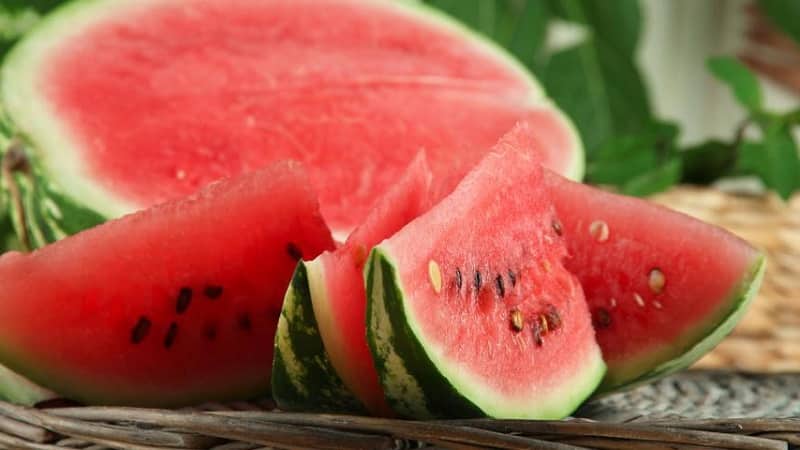
Defects of the cardiovascular system are not excluded. In women, vitamin B9 deficiency is manifested by weakness, increased fatigue, headaches, and there is a risk of miscarriage, placental abruption, and stillbirth.
During this period, fruit pulp is recommended to be used as a diuretic. to neutralize swelling: it cleanses the blood, liver, kidneys well, and removes excess fluid from the body.
During breastfeeding, watermelon will benefit mother and baby, provided that the woman ate it during pregnancy and it did not cause any side effects. However, its use should be limited to a nursing mother for the first 2-3 months after the birth of the baby.
Important! You should not eat watermelon if your baby has colic. Frequent consumption of large portions can worsen the general condition of the child, causing increased gas formation, bloating, dyspepsia, and other problems with the digestive tract.
Application for weight loss
Due to its taste and availability, watermelon has gained a large number of fans around the world as a means of losing weight. Rave reviews from girls and women who have painlessly lost several extra pounds confirm the effectiveness of the watermelon diet. If you get out of it correctly and then follow the principles of a healthy diet, you can consolidate the results for a long time.
In order to cleanse the body and correct body weight, fasting days are carried out on fruit pulp, which involve the use of watermelons and water in an amount of 2-3 liters. Despite the fact that the berry itself is juicy, free liquid is necessary to normalize the water-salt balance and to activate the process of removing waste and toxins from the body resulting from the decomposition of fatty deposits.
Usually practice one- and two-day fasting diets. Their frequency varies widely, but the most optimal frequency of fasting days is once every 7-10 days.
A more strict version of the diet lasts five days and includes only permitted watermelon pulp. in the amount of 1 kg per 10 kg of body weight + 2 liters of still purified water. This option for losing weight is unbalanced; the body experiences a deficiency of calories and other essential micro- and macroelements, vitamins, and is difficult to tolerate.

Possible negative consequences in the form of rapid weight gain, slowing down metabolism. Only people who do not have gastrointestinal diseases can practice this method of weight loss.
It is more rational to carry out a ten-day gentle watermelon diet, in the menu of which the pulp of fresh ripe watermelons is supplemented with water and unsweetened green tea, whole grain, rye or bran bread. The maximum result that can be achieved is minus 10 kg. The average figures vary between 5-7 kg.
During the diet, pasta, alcohol, energy drinks, bread, sugar-containing foods, snacks, snacks are completely excluded.. To consolidate the results, it is important to consume low-calorie dairy products, cheese, lean salads and vegetable soups, lean meats and fish for a few more weeks after completing the diet.
Afterwards, watermelon pulp is included in the diet at the rate of 1 kg per 30 kg of human body weight.
Read also:
Possible harm and contraindications
Watermelon tends to accumulate nitrates in the fruit. Their excess is toxic to the human body, negatively affects the condition and functionality of the digestive organs, provokes hypoxia and, worst of all, increases the risk of cancer.
Eating fruits against the background of diarrhea can lead to disruption of water-salt balance, dehydration of the body, leaching of calcium, which will negatively affect the condition of the musculoskeletal system and the strength of bone tissue.
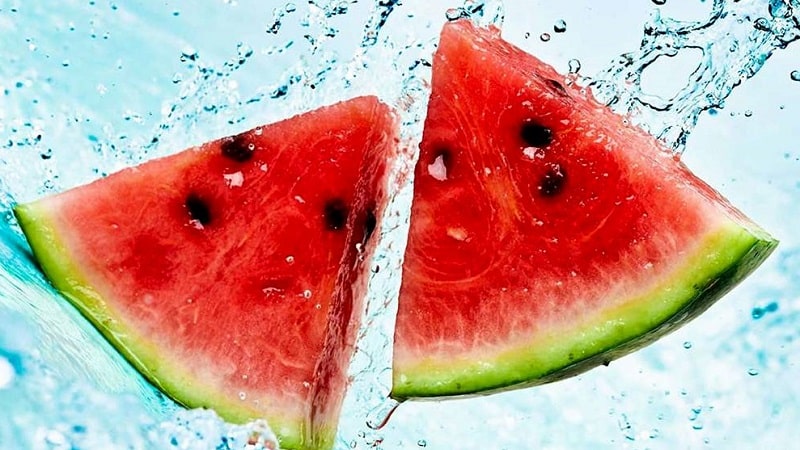
Due to its pronounced diuretic effect, watermelon should be consumed with caution. detection of large salt stones in parts of the urinary system (liver, kidneys, ureter, urethra). There is a possibility that the increased outflow of urine can dislodge stones and disrupt urodynamics, causing pain, blockage of the urinary tract, and kidney dysfunction.
Contraindications to consuming large portions of watermelon pulp relevant in the presence of diseases and pathological conditions such as:
- allergy to the product;
- diarrhea;
- stones of the ureter, urethra in the kidneys, liver;
- increased acidity of gastric juice;
- diabetes mellitus type 2 and 3;
- gastrointestinal diseases of an erosive-ulcerative nature, especially in the acute stage.
Conclusion
Now you know how watermelon is beneficial for the human body. This is a product that can be used to improve overall health, increase endurance and performance, alleviate the severity of symptoms and improve the prognosis in the treatment of diseases of the heart, blood vessels, liver, kidneys, nervous system and gastrointestinal tract.
The calorie content of watermelon is low, but it provides a quick feeling of fullness that lasts for a long time, which is why it is also used for weight loss. It is worth remembering about the existing contraindications to its use, so as not to harm the body.